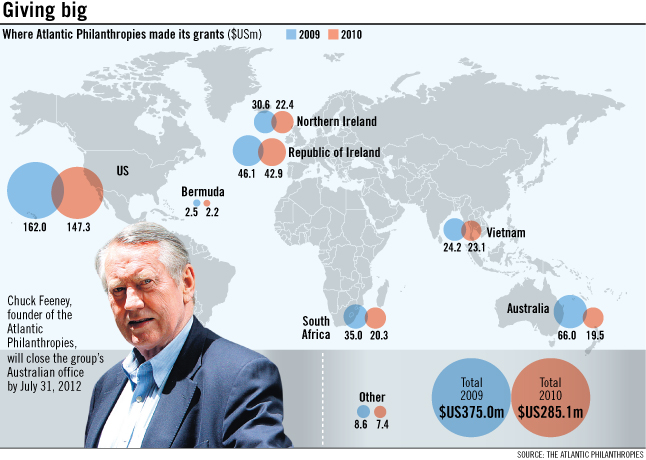Donor Bequeaths Philanthropy Template
Resource type: News
The Australian Financial Review | [ View Original Source (opens in new window) ]
By Rachel Lebihan
The nation’s most generous benefactor of university and medical research, Irish American Charles Feeney, is pulling out of Australia in line with plans to wind down his charitable trust by 2016.
The Atlantic Philanthropies will close its office in Sydney by July 31. Mr Feeney, who has donated around $500 million in Australia and leveraged an additional $1.5 billion in government and private sector support, has no plans for further investments in Australia.
Atlantic will spend itself out of existence in 2016, in line with the 80-year-old’s philosophy of “giving while living”. It will close in 2020.
Atlantic’s director of Australian philanthropic programs, David Kennedy, said winding down the Australian operation was a necessary part of the plan.
“All of our current commitments and grantee responsibilities in Australia remain active,” he said. “Grant administration for our Australian grantees will be managed from our New York office, and we will continue to interact with our grantees and monitor the impact of our investments.”
Atlantic is supporting six building projects in Australia, so significant funding will continue to flow for several more years.
Queensland’s Translational Research Institute (TRI) CEO and cervical cancer vaccine co-inventor Ian Frazer said as well as leaving a legacy of state-of-the-art research facilities such as TRI – to which Atlantic contributed $50 million– Mr Feeney had changed the Australian culture of philanthropy.
“He encourages Australian philanthropists, or potential philanthropists, to follow in his tracks, and he’s made government realise that philanthropy is a partnership between government and the philanthropist,” Professor Frazer said. Mr Feeney used Atlantic’s contributions to leverage support.

Several years ago Atlantic made donations contingent on government matching funds to the TRI, the Queensland Institute of Medical Research ($27.5 million), and Queensland University of Technology ($25 million).
More recently, Atlantic donated $10 million to the Menzies Research Institute at the University of Tasmania contingent on $5 million from local philanthropists.
And last year Mr Feeney challenged local philanthropists to match Atlantic’s $10 million donation to the University of NSW’s Kirby Institute for new facilities.
Last month Atlantic made its last Australian donation, of $5 million, to a head and neck cancer research centre in Queensland.
QUT vice-chancellor Peter Coaldrake said Mr Feeney had a “catalytic effect” on government and other philanthropists.
“The metaphor I use is glue: Chuck’s role has been to provide some glue to encourage people to think and work together differently to what they’ve done before,” Professor Coaldrake said.
“The issue is not to regret the fact that Atlantic is closing its doors in Australia but to think about what is Australia going to do from here because . . . we don’t want the [funding] curve to drop back, we want the curve to build.”
Mr Kennedy said Atlantic would continue to “encourage and support” philanthropy in Australia.
“We will be watching closely as our grantees and partners continue their ground-breaking work,” Mr Kennedy said.